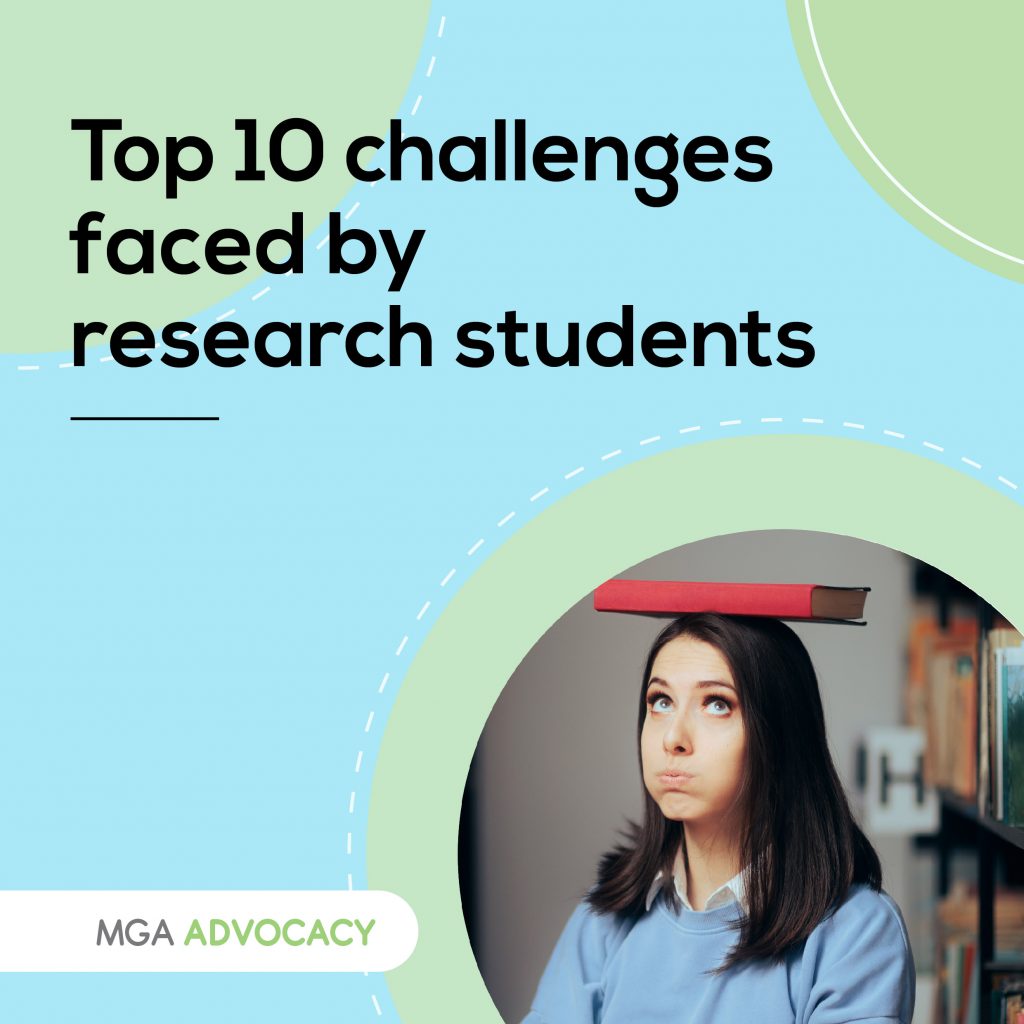Top 10 challenges faced by research students and how to overcome them

Whether you’re doing a PhD or a Masters by Research, we know that it can feel overwhelming. But remember – you’re not alone! Below, we’ve outlined some of the biggest concerns for research students at Monash, with helpful tips on how to tackle them.
#1: Workload
All HDR students have felt exasperated when trying to manage competing priorities between coursework, research and other commitments.
If you need some help staying on task, you can join the MGA’s Shut Up and Write group. If your academic workload is affecting your mental health, we suggest looking into Monash’s mindfulness programs and accessing help and resources via THRIVE. The MGA has extra resources on mental health and wellbeing here.
#2: Navigating deadlines and milestones
The research journey is a long one. It’s incredibly common to lose sight of what you need to get done and when. If you need advice on setting short to medium term goals to meet your deadlines and milestones, you can book a 1:1 consultation with a Student Academic Success advisor for further guidance. You can also check out The PhD Proofreaders, which has a gold mine of free resources and writing guides to keep you on track.
#3: Sharpening your research skills
We’re not born with informed and effective research skills, we learn them over time and with experience. Luckily, research students can book a 55-minute Zoom meeting with one of Monash’s specialist librarians, who will be able to guide you through the process and answer any of your burning questions. That way you can learn first-hand from an expert in research!
#4: Dealing with imposter syndrome
Many graduate students struggle with self-doubt, feeling inadequate or lacking confidence over the course of their research. It’s normal to feel this way, but that doesn’t make it true. In The Thesis Whisperer – a blog on all things research by ANU’s Director of Research Development, Professor Inger Mewburn – she externalises her imposter syndrome by naming it ‘Beryl’! You can read more about this here.
#5: Work life balance
We know, we know, no amount of work ever feels like enough. But overworking not only impacts your health, it actually makes you less productive! Sometimes, less is more. Learn more about work life balance and managing stress through THRIVE. And what’s more, there is now a Monash THRIVE App you can download and use for free to better understand how you are feeling and coping with your studies.
#6: Networking
Building your professional network is a key component to finding opportunities in your career. However, this can be easier said than done. It can be hard to know where to start or who to turn to. Keep an eye out for networking workshops through Career Connect or book a career consultation for uniquely tailored advice from a specialist.
#7: Funding and finances
Research students everywhere face financial difficulties, both personally and with funding. If you’re struggling, look through our Financial Assistance support guide to see if you are eligible to apply for any grants.
#8: Supervisory relationships
Many students have trouble navigating their relationship with their supervisor, especially when there’s a power dynamic. Communication is key here, but if you feel uncomfortable approaching your supervisor first, you can reach out to an MGA advocate.
#9: Getting published
Once the research is done, the next step is getting it published. This can be daunting for many HDR students. For students who are not doing a PhD by publication, it may still be important to consider publishing. Talk to your supervisor about the potential for or expectation of publishing while completing your thesis. Monash Library also has some great resources on publishing here.
#10: Feeling isolated
The HDR experience can be a lonely one. It is important over the course of your study to stay connected with your graduate student community, and that’s exactly what the MGA is here for! Meet likeminded people at our HDR social, come along to one of our events or join a Graduate Student Group.
Do you have more questions?
If you are unsure about anything else to do with your research journey, don’t hesitate to touch base with us at mga-advocacy@monash.edu